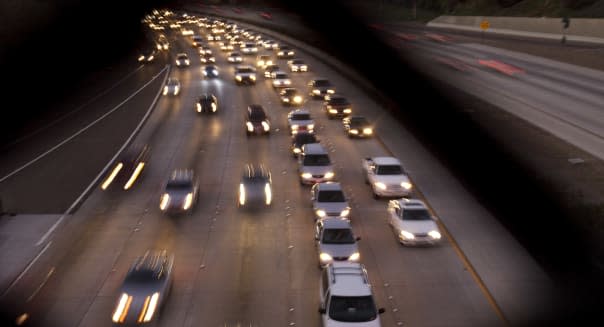7 Ways to Lower the Cost of a Holiday Road Trip

By Trent Hamm
The holidays are nearly upon us, with many families driving long distances to spend time with each other in the next weeks. Road trips are also an annual part of my family's holiday traditions, with our extended families living at least three hours away (and many relatives even farther).
Along the way, we've developed a lot of strategies for minimizing the cost of such road trips. Here are seven tactics anyone can pull off before and during long drives.
Fill your tires with air before you leave. Check your owner's manual and find out the maximum recommended pressure for your tires. Then stop at a gas station, and fill your tires to that pressure. All you need is a small pressure gauge, which most gas stations and convenience stores sell; if you need detailed instructions, check your owner's manual.
This saves money in two ways. First, automobiles with tires filled to the recommended level get better gas mileage than cars with tires that have lower pressure. Second, low pressure in your tires increases the chance of a blowout, so if you fill them up to the recommended pressure, you'll reduce your chance of an unwanted (and expensive) roadside stop.
Fill your tank with gas before you leave. This is an indirect strategy for saving money. When you're on the road and you stop to fill up for gas, it often can be tempting to go inside and get a cup of coffee or a soda or a snack. Gas station prices can be expensive, so this is just money disappearing from your pocket.
%VIRTUAL-WSSCourseInline-884%The best strategy we've found to battle this expense is to simply fill up our car with fuel before we leave. If we do this right before departing, there is minimal temptation to stop inside for a snack, which keeps money in our pocket where it belongs.
Pack snacks and meals. Another tactic for avoiding unnecessary convenience store expenses is to simply pack some snacks and beverages and even full meals before you leave. Choose items from your pantry, make sandwiches before you go, fill up a few water bottles and you'll have far less need to make an expensive stop.
Drive the speed limit. The obvious reason for doing this is to avoid getting pulled over, which could result in a very expensive traffic ticket. However, there's another, more subtle reason -- cars tend to be more fuel efficient when you drive at around 55 mph. The faster you go, the less fuel efficient they become, meaning you're going to spend more money on fuel just to cover the same distance. You might save five minutes an hour of driving by speeding, but over a long trip, that can add up to another stop at a gas station, which loses some of that time advantage and also gobbles up more money.
Keep updated registration and proof of insurance in the car. If you do get pulled over, that stop is going to be far less painful if you have proof of insurance and registration in the car, conveniently available. If you don't have these documents, you can expect a much more expensive traffic ticket. It's well worth spending 10 seconds (and the 10 minutes it might take to print new ones if you can't find them) to make sure you have these documents in your car to avoid the possibility of hundreds of dollars in tickets.
Refill your gas on the cheaper side of state borders. If you're crossing any state borders, you'll likely find very different gas prices on each side of that border. It can be well worth your time to stop just before crossing a state border -- or holding out until after a border crossing -- to get cheaper fuel. You can check out varying prices at GasBuddy's national gas price map. Some borders have a surprisingly large difference in fuel prices. The Iowa-Missouri border, for instance, can have as much as a 40-cent a gallon difference.
Avoid toll roads, even if it adds more miles to your trip. Toll roads can be a large additional expense on your journey, easily adding $10 or more to the trip. Thankfully, many online mapping tools like Google Maps can provide you with alternate routes to your destination that avoid toll roads. Adding another few minutes to your trip to avoid several tolls can end up saving you quite a lot of money.
Just a little bit of advance planning and some smart choices on the road can save you lots of cash on a holiday road trip. Using these strategies, you'll arrive at your destination with plenty of money still in your wallet where it belongs.
Trent Hamm is the founder of the personal finance website TheSimpleDollar.com, which provides consumers with resources and tools to make informed financial decisions.
